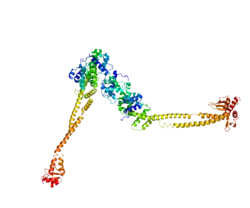NUF2
Kinetochore protein Nuf2 is a protein that in humans is encoded by the NUF2 gene.[5][6][7]
This gene encodes a protein that is highly similar to yeast Nuf2, a component of a conserved protein complex associated with the centromere. Yeast Nuf2 disappears from the centromere during meiotic prophase when centromeres lose their connection to the spindle pole body, and plays a regulatory role in chromosome segregation.
The encoded protein is found to be associated with centromeres of mitotic HeLa cells, which suggests that this protein is a functional homolog of yeast Nuf2. Alternatively spliced transcript variants that encode the same protein have been described.[7]
References
- GRCh38: Ensembl release 89: ENSG00000143228 - Ensembl, May 2017
- GRCm38: Ensembl release 89: ENSMUSG00000026683 - Ensembl, May 2017
- "Human PubMed Reference:". National Center for Biotechnology Information, U.S. National Library of Medicine.
- "Mouse PubMed Reference:". National Center for Biotechnology Information, U.S. National Library of Medicine.
- Wigge PA, Kilmartin JV (Mar 2001). "The Ndc80p complex from Saccharomyces cerevisiae contains conserved centromere components and has a function in chromosome segregation". J Cell Biol. 152 (2): 349–60. doi:10.1083/jcb.152.2.349. PMC 2199619. PMID 11266451.
- Nabetani A, Koujin T, Tsutsumi C, Haraguchi T, Hiraoka Y (Oct 2001). "A conserved protein, Nuf2, is implicated in connecting the centromere to the spindle during chromosome segregation: a link between the kinetochore function and the spindle checkpoint". Chromosoma. 110 (5): 322–34. doi:10.1007/s004120100153. PMID 11685532. S2CID 22443613.
- "Entrez Gene: NUF2 NUF2, NDC80 kinetochore complex component, homolog (S. cerevisiae)".
Further reading
- DeLuca JG, Moree B, Hickey JM, et al. (2003). "hNuf2 inhibition blocks stable kinetochore-microtubule attachment and induces mitotic cell death in HeLa cells". J. Cell Biol. 159 (4): 549–55. doi:10.1083/jcb.200208159. PMC 2173110. PMID 12438418.
- Strausberg RL, Feingold EA, Grouse LH, et al. (2003). "Generation and initial analysis of more than 15,000 full-length human and mouse cDNA sequences". Proc. Natl. Acad. Sci. U.S.A. 99 (26): 16899–903. doi:10.1073/pnas.242603899. PMC 139241. PMID 12477932.
- Tien AC, Lin MH, Su LJ, et al. (2004). "Identification of the substrates and interaction proteins of aurora kinases from a protein-protein interaction model". Mol. Cell. Proteomics. 3 (1): 93–104. doi:10.1074/mcp.M300072-MCP200. PMID 14602875.
- DeLuca JG, Howell BJ, Canman JC, et al. (2004). "Nuf2 and Hec1 are required for retention of the checkpoint proteins Mad1 and Mad2 to kinetochores". Curr. Biol. 13 (23): 2103–9. doi:10.1016/j.cub.2003.10.056. PMID 14654001. S2CID 16183757.
- Bharadwaj R, Qi W, Yu H (2004). "Identification of two novel components of the human NDC80 kinetochore complex". J. Biol. Chem. 279 (13): 13076–85. doi:10.1074/jbc.M310224200. PMID 14699129.
- Ota T, Suzuki Y, Nishikawa T, et al. (2004). "Complete sequencing and characterization of 21,243 full-length human cDNAs". Nat. Genet. 36 (1): 40–5. doi:10.1038/ng1285. PMID 14702039.
- Joseph J, Liu ST, Jablonski SA, et al. (2004). "The RanGAP1-RanBP2 complex is essential for microtubule-kinetochore interactions in vivo". Curr. Biol. 14 (7): 611–7. doi:10.1016/j.cub.2004.03.031. PMID 15062103. S2CID 13757802.
- Stucke VM, Baumann C, Nigg EA (2005). "Kinetochore localization and microtubule interaction of the human spindle checkpoint kinase Mps1". Chromosoma. 113 (1): 1–15. doi:10.1007/s00412-004-0288-2. PMID 15235793. S2CID 28231914.
- Meraldi P, Draviam VM, Sorger PK (2004). "Timing and checkpoints in the regulation of mitotic progression". Dev. Cell. 7 (1): 45–60. doi:10.1016/j.devcel.2004.06.006. PMID 15239953.
- Cheeseman IM, Niessen S, Anderson S, et al. (2004). "A conserved protein network controls assembly of the outer kinetochore and its ability to sustain tension". Genes Dev. 18 (18): 2255–68. doi:10.1101/gad.1234104. PMC 517519. PMID 15371340.
- Gerhard DS, Wagner L, Feingold EA, et al. (2004). "The status, quality, and expansion of the NIH full-length cDNA project: the Mammalian Gene Collection (MGC)". Genome Res. 14 (10B): 2121–7. doi:10.1101/gr.2596504. PMC 528928. PMID 15489334.
- DeLuca JG, Dong Y, Hergert P, et al. (2005). "Hec1 and nuf2 are core components of the kinetochore outer plate essential for organizing microtubule attachment sites". Mol. Biol. Cell. 16 (2): 519–31. doi:10.1091/mbc.E04-09-0852. PMC 545888. PMID 15548592.
- Ciferri C, De Luca J, Monzani S, et al. (2005). "Architecture of the human ndc80-hec1 complex, a critical constituent of the outer kinetochore". J. Biol. Chem. 280 (32): 29088–95. doi:10.1074/jbc.M504070200. PMID 15961401.
- Nousiainen M, Silljé HH, Sauer G, et al. (2006). "Phosphoproteome analysis of the human mitotic spindle". Proc. Natl. Acad. Sci. U.S.A. 103 (14): 5391–6. Bibcode:2006PNAS..103.5391N. doi:10.1073/pnas.0507066103. PMC 1459365. PMID 16565220.
- Gregory SG, Barlow KF, McLay KE, et al. (2006). "The DNA sequence and biological annotation of human chromosome 1". Nature. 441 (7091): 315–21. Bibcode:2006Natur.441..315G. doi:10.1038/nature04727. PMID 16710414.
- Olsen JV, Blagoev B, Gnad F, et al. (2006). "Global, in vivo, and site-specific phosphorylation dynamics in signaling networks". Cell. 127 (3): 635–48. doi:10.1016/j.cell.2006.09.026. PMID 17081983. S2CID 7827573.
- Ewing RM, Chu P, Elisma F, et al. (2007). "Large-scale mapping of human protein-protein interactions by mass spectrometry". Mol. Syst. Biol. 3 (1): 89. doi:10.1038/msb4100134. PMC 1847948. PMID 17353931.
- Liu D, Ding X, Du J, et al. (2007). "Human NUF2 interacts with centromere-associated protein E and is essential for a stable spindle microtubule-kinetochore attachment". J. Biol. Chem. 282 (29): 21415–24. doi:10.1074/jbc.M609026200. PMID 17535814.
This article is issued from Wikipedia. The text is licensed under Creative Commons - Attribution - Sharealike. Additional terms may apply for the media files.




